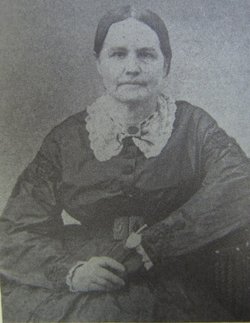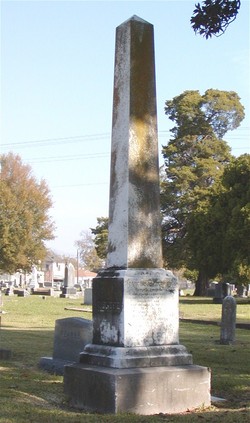The patriarch of the family, Isaiah, was born in the town of Franklin, TN September 16, 1812. His birthplace would later be the site of the Battle of Franklin during the Civil War. In 1816, Isaiah's parents moved to Saline County, MO, from which state he was appointed to West Point. He became a graduate of that famous academy in 1833. Isaiah's sight was defective, so he resigned his military commission in 1834 and moved to Ouachita Parish. Garrett was interested in the legal profession, so in 1835 he obtained his license to practice. He went into practice with Judge E.K. Willson, one of the most distinguished lawyers of North Louisiana. Garrett's law office on South Grand Street, is still standing today and is considered one of Monroe's oldest buildings.
Shortly after moving to Monroe, Isaiah met and fell in love with a charming lady by the name of Narcissa Grayson. Narcissa's father, Col. Thomas Grayson, was a compatriot of Daniel Boone and moved to Caldwell Parish in 1813. The Graysons were one of the founding families of Caldwell Parish. The town of Grayson was named in honor of the family. Thomas approved of the young lawyer courting his youngest daughter, and so, Isaiah and Narcissa were married in Ouachita Parish on May 10, 1836. The couple were the parents of eleven children; five of whom lived to maturity.
An incident in the life of Narcissa and Isaiah, illustrates the limited medical knowledge of the early 1800's. In February of 1844, Isaiah and Narcissa took a trip to New Orleans to hear the great orator and Congressman Henry Clay speak. With them on the trip were their three year old son Frank and his nurse. After a delightful time in the city, the couple and several others from Ouachita decided to take the trip back home to Monroe on board the steamboat Buckeye. Isaiah refused to retire to his room until the boat had left the Mississippi river. Narcissa placed her son on the lower berth and lay down on the upper berth. Some time between three and four o'clock in the morning, Narcissa was jarred awake by a collision. It felt as if the ship had run into the bank. In reality, the Buckeye had collided with the steamboat DeSoto. Isaiah came back to his cabin, collected the family and began making his way to the bow. Narcissa was swept away by the current and became separated. She was later rescued. Frank had been separated from Isaiah by the crowd, but was found floating on a mattress by a family friend. Isaiah was later found half drowned, but alive. Only after Narcissa was rescued and placed by a fire did she feel her left wrist in excruciating pain. It was later determined that her wrist bone had split during the accident. A year after the accident when her hand did not improve it was amputated by a doctor in New Orleans. The operation was before the use of chloroform, so Narcissa endured the procedure awake.
Isaiah retired from law in 1857 to his estate called Lindwood. He had a reputation of being an honest, upright citizen and everyone thought well of him. It was that reason why, in 1861, he was called to represent Ouachita in Louisiana's Secession Convention. Garrett lobbied hard as a cooperationist, and warned the convention that it would be a long and bloody war if Louisiana seceded. He was one of only seven men that refused to sign the ordinance of secession. Garrett returned to his beloved Lindwood and prepared for war.
Because of his vision, Isaiah could not serve the Confederacy as a soldier, but he served in other ways. Two sons were sent to serve the Confederacy. Isaiah became chairman of the state military board. After his service there, he returned to Ouachita and established a private hospital for wounded and sick Confederate soldiers all the way to the end of the war.
After the Civil War, Isaiah came out of retirement and practiced law again. He became a well-known Democrat and fought against Reconstruction right up until his death. In early May of 1874, Isaiah and his friend Henry Dobson were riding down DeSiard Street in a two-horse buggy. The horses took fright and made for the river at head-long speed. Mr. Dobson saw a vacant lot and steered the horses into it. While turning the buggy, it overturned in the lot, throwing Dobson and Garrett on the ground. Garrett landed on his head. Dobson recovered, but Garrett lingered in a coma for three days. On May 7, surrounded by friends and family, Isaiah breathed his last. He was buried in Monroe's Old City Cemetery. Narcissa survived Isaiah by sixteen years and was buried beside him. There they continue to rest over one hundred years later.


